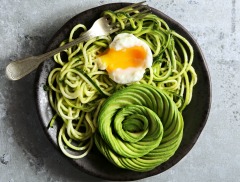Don't just meal plan... meal plan intelligently - with Meal Genius! Sign up for our free newsletter to get delicious recipes, sample meal plans and a whole lot more!
Bok Choy
Bok choy is a Chinese cabbage and member of the cruciferous family of vegetables.
Rich in vitamin C and folate, bok choy also contains powerful phytonutrients called glucosinolates which help to reduce the risk of numerous forms of cancer. With its deep green leaves, bok choy has more beta-carotene than other cabbages.
Estimated Glycemic Load = 1
The Benefits
- Special diets: Autoimmune Paleo Diet, Elimination Diet, Gluten-Free Diet, Gluten-Free/Dairy-Free Diet, Grain-Free Diet, High Protein Diet, Low Acid Diet, Low Carb Diet, Low FODMAP Diet, Low Histamine Diet, Low Oxalate Diet, Low Starch Diet, Paleo Diet (Light), Paleo Diet (Strict), PCOS Diet, Pescetarian Diet, Primal Diet, Vegetarian Diet, Whole Food
- Excellent Source of: VitaminA, VitaminC, VitaminK
- Good Source of: Folate
- Preferences: No Fish, No Red Meat, No Pork, No Eggs, No Shellfish, No Gluten, No Nuts, No Seeds, No Soy, No Dairy, No Poultry, No Corn, No Yeast, No Peanuts, No Molds, No Coconut, No Pseudograins, No Citrus, No Nightshade, No Legumes, No Grains, Low Carbohydrate, Low Cholesterol, Low Fat, Low Sodium, Low Sugars, Low Saturated Fat
Related Foods
Related Nutrients
Selecting and Storing
Look for stalks that are thick, fleshy and firm. The leaves should be crisp and green. Avoid bok choy with bruises or slimy spots. Place unwashed heads of bok choy in a loosely closed plastic bag and refrigerate for no more than a day or two. Bok choy is more perishable than traditional head cabbages.









